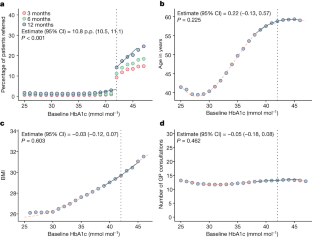2023-11-15 バーミンガム大学
◆英国、ドイツ、アメリカ、南アフリカの研究チームが200万人以上の患者データを分析し、プログラムへの参加が2型糖尿病のリスク因子を改善することを強力に示しました。統計手法を用いた研究により、プログラムへの参加が糖代謝の制御やBMI、体重、コレステロールの減少に結びついたことが判明。糖尿病前期患者の健康改善におけるライフスタイルカウンセリングの利点が明確に示され、これが広範な人口の健康向上にも寄与する可能性があるとされました。
<関連情報>
- https://www.birmingham.ac.uk/news/2023/uk-diabetes-prevention-programme-may-have-global-impact
- https://www.nature.com/articles/s41586-023-06756-4
全国的な糖尿病予防プログラムの準実験的評価 Quasi-experimental evaluation of a nationwide diabetes prevention programme
Julia M. Lemp,Christian Bommer,Min Xie,Felix Michalik,Anant Jani,Justine I. Davies,Till Bärnighausen,Sebastian Vollmer & Pascal Geldsetzer
Nature Published:15 November 2023
DOI:https://doi.org/10.1038/s41586-023-06756-4

Abstract
Diabetes is a leading cause of morbidity, mortality and cost of illness1,2. Health behaviours, particularly those related to nutrition and physical activity, play a key role in the development of type 2 diabetes mellitus3. Whereas behaviour change programmes (also known as lifestyle interventions or similar) have been found efficacious in controlled clinical trials4,5, there remains controversy about whether targeting health behaviours at the individual level is an effective preventive strategy for type 2 diabetes mellitus6 and doubt among clinicians that lifestyle advice and counselling provided in the routine health system can achieve improvements in health7,8,9. Here we show that being referred to the largest behaviour change programme for prediabetes globally (the English Diabetes Prevention Programme) is effective in improving key cardiovascular risk factors, including glycated haemoglobin (HbA1c), excess body weight and serum lipid levels. We do so by using a regression discontinuity design10, which uses the eligibility threshold in HbA1c for referral to the behaviour change programme, in electronic health data from about one-fifth of all primary care practices in England. We confirm our main finding, the improvement of HbA1c, using two other quasi-experimental approaches: difference-in-differences analysis exploiting the phased roll-out of the programme and instrumental variable estimation exploiting regional variation in programme coverage. This analysis provides causal, rather than associational, evidence that lifestyle advice and counselling implemented at scale in a national health system can achieve important health improvements.


